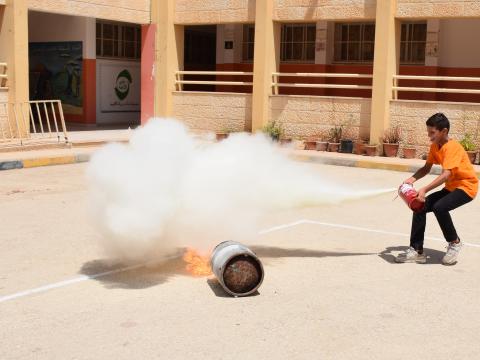Strengthening Disaster Risk Reduction in Schools in Area C of the West Bank

West Bank, 30 May 2023
World Vision, in collaboration with the Comprehensive Health Department at the Ministry of Education, has successfully implemented seven training workshops aimed at strengthening the capacities of 50 schools in area C* of the West Bank to prepare for and respond to disasters. These workshops are part of the project "Building resilience and ensuring protective hygiene in WASH and Disaster Risk Reduction (DRR) systems at the school level in Area C", generously funded by the German Federal Ministry for Economic Cooperation and Development (BMZ). This project will be implemented from August 2021 to March 2024 for a budget of 2 million Euros. It aims to improve students access to enhanced Water, Hygiene and Sanitation (WASH) facilities, promote hygiene practices, and increase the readiness of students and schools to respond to disasters.
A total of 119 participants (64 males and 55 females), including School Headmasters, Field Health Supervisors, Health Committee Focal Points, and Heads of the School Health Committee, attended the workshops. These participants represented 50 schools located across seven Governorates (Bethlehem, Hebron, Jenin, Nablus, Salfit, Jericho and Tubas).
"Disaster management and risk reduction are of utmost importance in ensuring the safety of our students, especially given the emergencies we face in our society. The workshop covered vital topics such as emergency planning and updates, as well as the identification of potential risks within the school environment. Emphasis was placed on prioritization and aligning actions accordingly. The information shared during the workshop was highly valuable and provided fresh insights. I strongly recommend extending this training to all schools, as the subject matter is crucial and can benefit everyone involved” said Kharia, the Head of the School Health Department in Jenin Directorate of Education about the ToT program.
World Vision developed these training workshops to equip participants with the essential skills and knowledge to address the different hazards affecting the safety of the students, including an outbreak of pandemic, while also reducing their impact on climate change and the environment. During the workshops, the key findings of the mapping of the risks and hazards affecting these schools were shared and discussed. These mapping, conducted by specialists of disaster risk reduction and preparedness identifies in all the targeted schools the risks (floods, violence, etc.) and hazards (faulty electrical system, inadequate or dilapidated infrastructures, etc.) that needs to be taken into account into the school preparedness plans and the school safety plan to protect the students.
The training approach was designed to be highly interactive, fostering participants' understanding and promoting a comprehensive definition of school safety. The training covered key areas, including identifying potential risks students may face at the school level, crisis response planning (including emergency protocols, evacuation procedures, and communication strategies during emergencies), preparedness for potential risks, and the essential elements of an effective and efficient safety plan. Leading the workshops was Muath Daraghmeh, a Certified Senior Consultant and an expert in the field of school safety and Disaster Risk Reduction.
Notes for the editors
About the area C of the West Bank
The Oslo Accords divided the Palestinian West Bank into three administrative zones: Area A (18%), where the Palestinian Authority (PA) administers civil and security matters; Area B (22%), where the PA administers only civil matters; and Area C (60%) where Israel maintains full control, including over law enforcement, planning and construction. Palestinian communities in Area C are among the most vulnerable in the West Bank. The lack of an appropriate planning and zoning system in Area C means that most Palestinian communities cannot obtain permits for the construction or rehabilitation of essential infrastructures such as schools (source: OCHA).
About the project
Building Resilience and Ensuring Protective Hygiene in WASH and DRR Systems at School-Level in Area C - West Bank is implemented by World Vision and the Palestinian Hydrology Group, in partnership with Ministry of Education. It is funded by the German Federal Ministry of Economic Cooperation and Development (BMZ). It will be implemented from August 2021 to March 2024 for a budget of 2 million Euros.
The project aims to improve students access to enhanced Water, Hygiene and Sanitation (WASH) facilities, promote hygiene practices, and increase the readiness of students and schools to respond to disasters. In addition, the project’s interventions directly benefit the schools through the development of the school safety plans, the training for school health committees and teachers, awareness and capacity building activities at school and community levels, WASH infrastructure work and the development of Disaster Risk Reduction (DRR) tools.
About World Vision
World Vision International is a Christian relief, development and advocacy organisation dedicated to working with children, families and communities to overcome poverty and injustice. The organisation started to work in the West Bank and Gaza in 1975. Since then, World Vision JWG has developed one of the largest community-based presence of any organisation operating in the West Bank with 91 dedicated staff and a total annual budget of US$11 million. In 2022, our programming on Education in Emergencies, early childhood development, child protection and child resilience benefited directly more than 233,000 people, including 169,000 children in 150 villages in eight governorates of the West Bank.